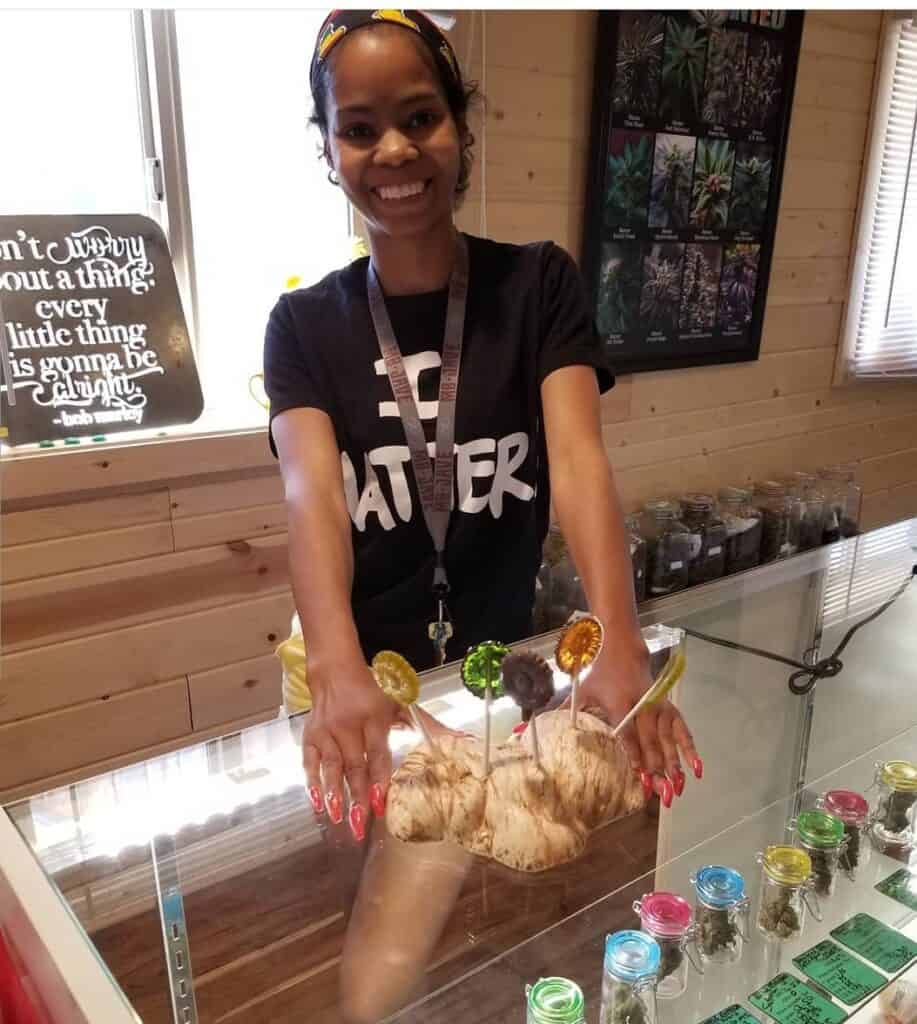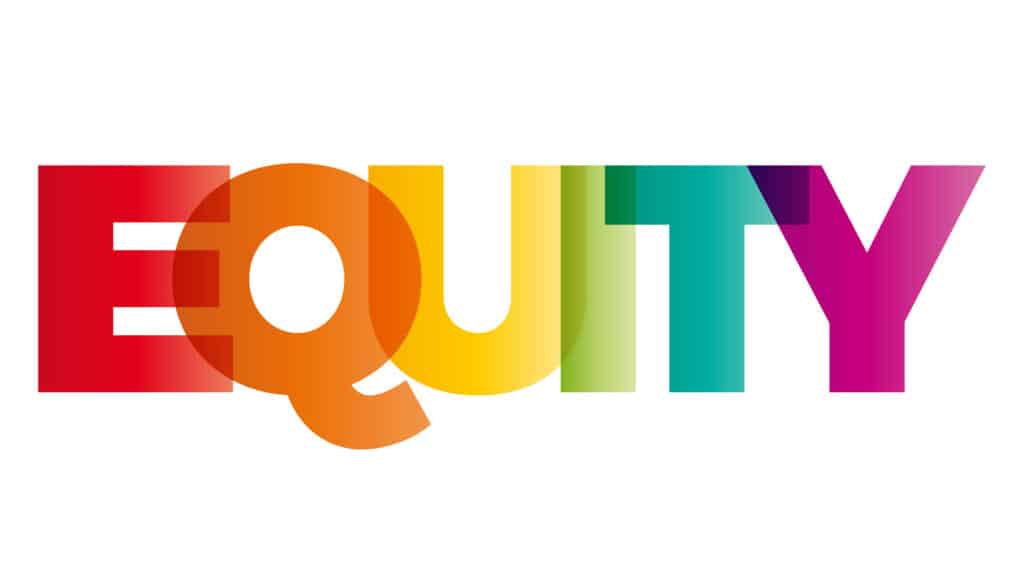When Portia Mittens opened The Coughie Pot in Sumter in 2017, she had an expectation. She figured that as the industry grew, she’d begin seeing other Black dispensary owners. But she says that hasn’t happened. Out of the 755 dispensaries in Oregon, only a handful are Black owned.
“I meet so many people who say, man, I wish I could do what you are doing. I wish there was a way. And it hurts me because it shouldn’t be a wish,” she says. “It should be a true possibility. It should be something people really believe they can achieve. We need to do our part to get people in.”
Portia Mittens thinks HB 3112 could be the way to do that.
Otherwise known as the Oregon Equity Investment Act, HB 3112 is arguably the most progressive and comprehensive piece of cannabis equity legislation the US has ever seen. The bill would establish new cannabis business licenses specific to equity applicants, fast track equity licenses, and leverage tax dollars to support automatic expungement for cannabis offenses. That’s impressive but also fairly standard for equity legislation. The real difference here is the scope at which the legislation proposes reinvesting in Oregon’s most economically vulnerable communities.
Perhaps HB 3112 is different because it was created during a time of reckoning and listening. As protests shook the city of Portland in July of 2020, Jeannette Ward Horton and Brett Mulligan convened a work group to explore how to correct historic disparities and create meaningful change for people whose lives have been damaged by over-policing.

“Last summer, facing the worst examples of police violence against the Black community, coupled with the economic and health vulnerabilities COVID-19 exacerbated for Black and brown communities, it felt urgent to pursue cannabis equity immediately,” says Ward Horton, founder of the Cannabis Equity PAC and executive director of NuLeaf Project, which is dedicated to building diversity in the cannabis industry.
Nationwide, only 2.7 % of cannabis companies are Black owned. Many states with legal cannabis have tried to correct this disparity by passing equity legislation. But so far these programs tend to be chronically underfunded and thus fall short as efficient engines of change.
Ward Horton and Brett Mulligan, the president of Willamette University’s Students for Sensible Drug Policy (SSDP), wanted to try something bolder. They were joined by Senators Lew Frederick and Kayse Jama, as well as Oregon state representatives Julie Fahey, Ricki Ruiz, Karin Power, and Akasha Lawrence Spence. The original work group of 40 volunteers quickly swelled to 80, including cannabis brands, industry advocacy groups, and community organizations such as NAACP Portland and Urban League PDX. Together they created ambitious legislation that could provide meaningful funding to correct the damage caused by over policing and the War on Drugs.
“This is a truly holistic bill. It is truly reparative. It is looking holistically at the ways cannabis criminalization and the War on Drugs has impacted our communities, and it’s finding the modalities to rectify those injustices and that harm,” says Representative Akasha Lawrence Spence.

“The magnitude of it is a significant step forward compared to most of these other bills. We’re aiming to make something that’s going to be a road map for other states to follow,” says Casey Houlihan, executive director of The Oregon Cannabis Retailers Association (ORCA).
As Oregon Equity PAC explains, “The most important work this bill does is amass approximately $50M per year and growing for investing in Black, Indigenous, and Latinx Oregonians’ home and land ownership, job training and placement, childcare, and small business funding for all types of businesses.” An independent governing board of people from impacted communities would be established to allocate funds and track return on investment.
“The community investment fund really is the heart of this bill,” Jeannette Ward Horton stated in a recent town hall meeting.
So where will all this money come from? The Oregon Equity Investment Act proposes using 25% of all cannabis taxes before allocation, as well as appropriating an additional 15% of the cannabis taxes allocated to state police and 10% of the money that’s accumulated from the state’s criminal fines account. This could leave the equity fund with around 100 million dollars–and growing.
For those concerned that this money could deplete other programs, Casey Houlihan breaks it down: “The revenue from cannabis taxes are now on track to exceed the state’s original estimates–around which the agencies who receive that funding designed their budgets–by a factor of five. Last year alone, the industry experienced a 39% growth in sales. The accompanying growth in tax revenue from 2020 is more than sufficient to account for the resources this bill requires in order to be successful.”
A number of the participants in the work group were people with firsthand experience of what it’s like to live with a cannabis conviction and that shows in the level of detail written into the expungement legislation, which was spearheaded by Wyld’s general counsel, Gabe Parton Lee. In particular, the work group wanted to reverse the financial burden of a cannabis conviction.
As Representative Akasha Lawrence Spence explained at a town hall meeting,“The average person who has been previously incarcerated is in debt to the state over 15,000 dollars. That money is a part of their sentencing, but it’s also the fact that you have to pay to be paroled. In the state of Oregon, that’s upward of $35 dollars a week. You also have to pay every time they drug test you and every time they come out to your home. So not only is it hard to get a job, but you can’t apply for FAFAs, you can’t apply for an SBA loan. You have very limited modalities to economically mobilize, so they’re creating a debt burden for you, and it’s really a kind of debt prison because it’s hard to get out of it.”

The Equity Investment Act would open the doors of this debt prison by forgiving the fines and fees owed by people with unsatisfied judgements. It would also fund a massive automatic expungement project that would be far more efficient than Oregon’s existing expungement program, which has so far expunged fewer than 200 cannabis convictions out of over 28,000 eligible candidates.
In addition to easing financial and legal burdens, HB 3112 would create financial and legal opportunities. The bill establishes a delivery license and on-premise consumption license that would be limited to applicants of color or those with prior cannabis convictions. (Existing delivery licensees would be grandfathered in and the licenses would open up to all applicants after six years.) The legislation would also streamline the application process and fund two full time OLCC employees dedicated to supporting equity licensees.
“We were thinking about what hurdles undercapitalized entrepreneurs face in the cannabis industry. These equity licenses are for recreational cannabis licenses and they come with significantly reduced fees, faster time to process the license, and additional support from the OLCC,” says Jeannette Ward Horton.
By all accounts there has been an unusual degree of cooperation in crafting the legislation. “I’ve been very impressed at the way this work group has been run,” says Casey Houlihan of ORCA, who particularly credits Representative Lawrence Spence. Ward Horton echoes this sentiment: “Her office drove an incredibly powerful collaborative legislative effort allowing us to break through some very difficult hurdles in effective cannabis equity legislation.”
This bill has passed through several work sessions and will likely come before the legislature during this summer’s session. So what are its chances? Although there has been some wrangling, HB 3112 seems to have more supporters than opponents. Houlihan says he’s been impressed by the level of enthusiasm from the cannabis industry–even from companies and individuals that don’t stand to benefit from it. Supporters include Weedmaps, Dutchie, Moss Crossing, and Siskiyou Sungrown, as well as Wyld and Groundworks, who, in addition to financial support, have been an instrumental part of the work group.

Dispensary owner Portia Mittens appreciates the equity coalition’s holistic approach to problem solving. “Having a dispensary is not the end,” she says. “It’s the beginning. We need a healthy ecosystem. We don’t just need to see people making money–we need our communities to be healthy, our communities to be whole. Because when our communities are whole, our world becomes more whole. It becomes more safe. When people can provide food for their family, when people can provide safety for their family…it just really changes the outlook on life, period. This bill helps do that and that is why I support it wholeheartedly–because I want to see more people win.”





3 thoughts on “Equity legislation with teeth? Oregon’s proposed law could change the industry”
Pingback: Why did Oregon Democrats kill the state's much needed equity legislation? - MJ Brand Insights
Pingback: Industry pioneer Jesce Horton joins advisory board of MJ Unpacked - MJ Brand Insights
Pingback: Oregon’s Equity Investment Act passed in the House, approving $15 million fund  - MJ Brand Insights